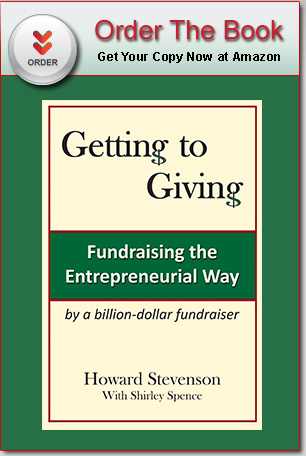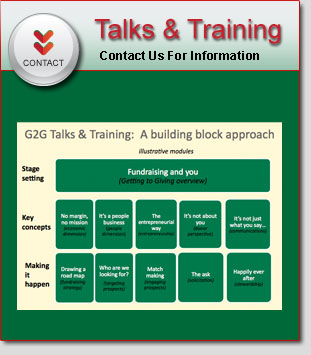 “How can you do fundraising? It’s so unpleasant.” Have you been asked that? I have, more than once. Many nonprofit volunteers and directors themselves will say they hate asking people, especially their peers, for money. My response is that I’m proud of the fundraising work I do. I’m not asking for myself. I’m asking for a cause I believe in. And I’m helping donors accomplish their philanthropic and personal goals. I wouldn’t do it otherwise.
“How can you do fundraising? It’s so unpleasant.” Have you been asked that? I have, more than once. Many nonprofit volunteers and directors themselves will say they hate asking people, especially their peers, for money. My response is that I’m proud of the fundraising work I do. I’m not asking for myself. I’m asking for a cause I believe in. And I’m helping donors accomplish their philanthropic and personal goals. I wouldn’t do it otherwise.
So, here are the two questions you must ask yourself: Am I personally committed to this cause? Do I believe I am helping donors achieve their goals by contributing to it?
The begging psychology often comes from the expectation that you’ll be turned down by many, some say two-thirds, of the people you approach. That doesn’t have to be the case. In fact, it signals poor fundraising. Much preparation is required before you get to the ask. Do you understand what motivates the prospect? What stage is he at, in his life? If he’s 40 years old, a legacy gift makes no sense. You want his money. What can you offer, to solve a problem that is important to him? With that kind of deep understanding, you should be getting to a “yes” about 80% of the time.
I’ll often begin with “I’m asking you to share in something I believe is important.” But it isn’t, of course, that simple. In addition to talking about the right things, at the right time, your pitch needs to be buttressed by facts and expressed in terms meaningful to the prospect. With Nature Conservancy people, you talk about vernal pools. With business people, you talk numbers. And, regardless of the audience, it sometimes involves more than talk. It may require show-and-tell, to really excite a prospect.
Early in the Harvard Business School (HBS)’s Capital Campaign, I received a call from a former HBS section-mate who had made a gift several years earlier. He announced that he didn’t want to fund five chairs, but if I could prove he could make a difference, he’d be interested in making a gift. There were proposals, silence, summons for meetings, more silence. Then I received a phone call message, to meet him in New York at an event being held, in his classmate’s honor, by another philanthropic organization. I personally bought a table, and took some key players from the project we were proposing. My classmate met and liked them. The next day, they all returned to Boston, for a tour of project facilities and work-in-progress. Discussion of gift agreement terms began, several years after the initial contact.
Being comfortable with fundraising is partly a matter of knowing your personal style. I can’t understand how one of my friends can spend hours participating in a phonathon. I like face-to-face interactions; I can read people and their reactions, if I can see them. But, I have a hard time doing cold calls, with no background information about the person.
There are times when volunteers or directors simply can’t get comfortable “making the ask.” Faced with this problem, one development officer said to the organization’s president: “You set it up. I’ll say the words.” The teaming, which required trust on both sides, worked beautifully. Roles also can vary depending on the prospect, and over time. It’s important to be clear on who has what role, when. That may include having no role.
At least two mega-million dollar donors cultivated by Howard had no interest in meeting Harvard’s President, a source of great consternation to many. The donors weren’t interested in hierarchy; they were dying to meet the academic leaders they were being asked to sponsor. My role sometimes diminished slightly during the solicitation process as well. Imight become more of a facilitator, as the project and proposal took shape. I didn’t mind, so long as the check arrived with the right number of zeros.
Closing may or may not be part of leadership’s job, but thanking always is. You should always be grateful for a donor’s commitment to your cause, and offer thanks in a way compatible with his wishes. Don’t assume he wants his name on something. Some donors prefer no public acknowledgement, and would be downright offended at suggestion. Others may want it, but it isn’t their primary interest. Showing them the impact of their contribution is much more powerful. The HBS development team organized an annual dinner for donors and recipients of fellowships, and found donors most appreciative. SummerSearch regularly brings its students together with donors.
On the flip side, the form of acknowledgement also must be acceptable to the donee. Some institutions may not feel it tasteful to have too much naming activity. In other environments, such as hospitals, it is quite common. Also, some organizations have developed a proposal clause stating that a donor’s naming rights will be rescinded if he is convicted of a crime. Would you want a felon’s name emblazoned on one of your buildings?



